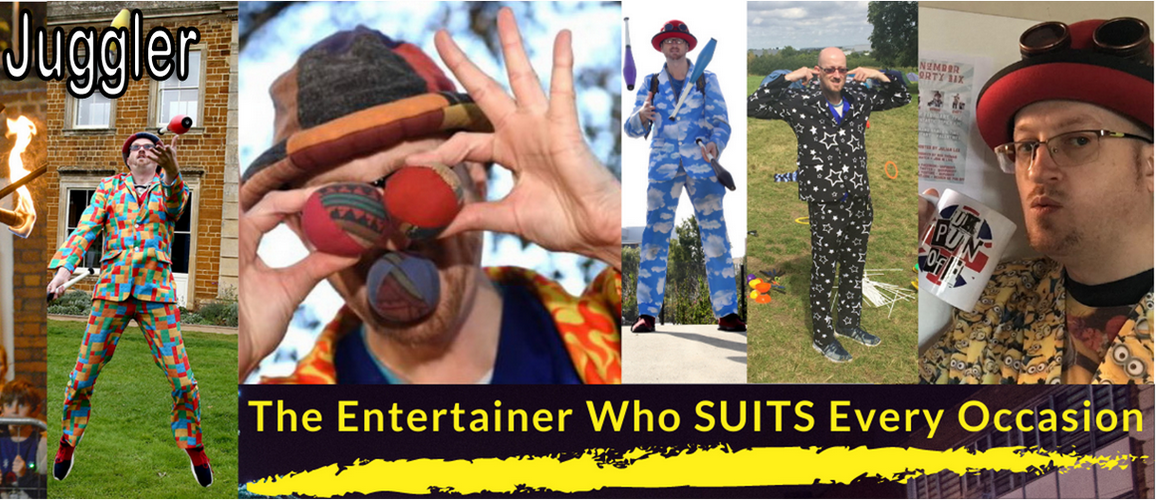This page is split into 3 sections which explore the Social, Educational and Physical Benefits of learning to Juggle and use Circus Skills props (eg diabolo, plate spinning etc). The words “juggling” and “circus skills” are interchangeable on this page. The art of throwing objects in the air such as balls, rings and clubs, as well as manipulating objects such as diabolo, devil stick, spinning plates all offer the same benefits for willing pupils!
LATEST RESEARCH FROM OXFORD UNIVERSITY (12 October 2009) –
“Juggling Increases Brain Power” (BBC News article)
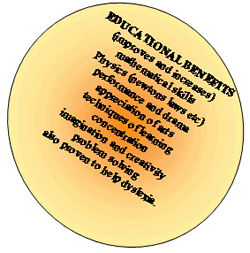 |
EDUCATIONAL BENEFITS
Improves and Increases:
|
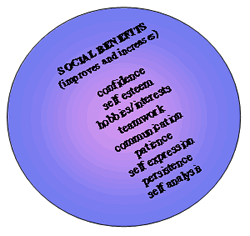 |
SOCIAL BENEFITS
|
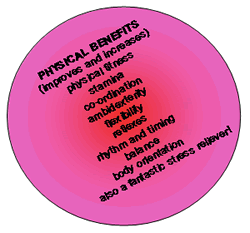 |
PHYSICAL BENEFITS Improves and Increases:
|
Educational Benefits
Cognitive Benefits – To succeed in juggling, students must understand a pattern, set targets for their throws and work on the rhythm and timing of their throws.
The evidence for many Educational Benefits can be found in the book: Teaching Elementary Physical Education – by Robert P.Pangrazi.
A great break in the daily routine – During extensive academic work periods (such as daily lunch breaks from work/studies), physically active study (such as juggling) can help students return to their work/studies feeling refreshed and more productive. Kinaesthetic and Physically active learners will love to learn juggling especially! If you introduce juggling breaks/intervals into your regular studies/school day, then you will see these types of learners improve academically!
Appreciation of the Arts – Once you have seen how easy juggling is to learn the basics, then you begin to see how many hundreds of thousands of tricks are out there for you to master. Any time you see someone juggling, you then begin to appreciate the amount of time and effort they will have put into achieving such a routine! If students work on putting together a show at the end of their workshop, they begin getting a small glimpse of what it is like to work in the entertainment industry.
Imagination and Creativity – once you get involved with juggling, you can let your imagination run wild and experiment with the tricks you have learned. You may end up inventing a new trick, or even just a different way of achieving a trick just by imagining different patterns and different routines that may be possible!
Good for your brain – Studies have shown that people who challenge their brains and use them for complex tasks throughout their life have a reduced incidence of alzheimers disease.
Helps Dyslexia – It has long been thought that juggling can help disabilities such as dyslexia, attention deficit disorders and hyperactivity. This is through the knock-on effect of all the other benefits such as improved concentration, problem solving etc.
Improves Student Behaviour – Schools with juggling programmes tend to report quite satisfactorily that student behaviour has improved amongst the pupils who tend to create the most trouble.
Problem Solving – Students learn to break each juggling trick down into its small component parts, learn each of the parts, then learn how to combine each part to form the trick. If they get stuck at any particular point in juggling, they can guarantee that someone more experienced will be able to offer advice to help further.
Juggling Can Boost Brain Power – Learning to juggle can cause changes in the brain, scientists have found. Using brain scans, the researchers showed that in 12 people who had learnt to juggle, certain brain areas had grown. But three months later, during which time people stopped juggling, the brain had gone back to its normal size. To read more on this amazing discovery, please visit the article on the BBC News Website.
The Brain Power article can also be found on the CNN website – Juggling good for the brain
*****************************************
FOLLOW / LIKE / SUBSCRIBE / ENJOY!!
![]()
![]()
![]()
![]()
![]()
![]()
You can hire Steve the Juggler aka Stevie Vegas – for more details try…
Juggler for Hire section – (based in the United Kingdom)
*****************************************
Contact Juggling can help RSI (repetitive strain injury): On a Jugglers forum on LinkedIn, I found the following comment: ” I am a long time juggler with RSI in my wrists, and believe it or not I use Contact Juggling as physical therapy! (yep, its prescribed ). The gentle movements and heavy weight of the ball make for excellent therapy and muscle building. My PT was amazing and stated she would be teaching future wrist patients the art 🙂 ” (comment by Raven Lockwood)
Some Further Articles/Research to Read
(external research – links will open in a new browser window)
- The Academic Benefits (a fantastic article by Dave Finnigan!)
- Teachers link juggling to Improved Academic Skills
- Mathematics of Juggling – Book Review
- Exercising Both Sides of the Brain – See Brain Gym website
- Juggling as Performing Mathematics article
- Observation Experiment on the Physics of Juggling – (this link takes a while to load and you need quicktime installed on your computer)
- A physics lesson – on objects such as rings and clubs react differently when thrown through the air
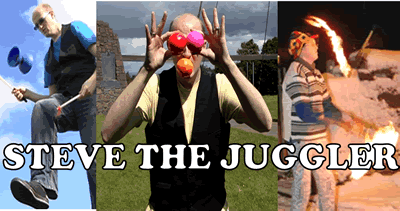
Click to find out more about Steve’s Circus Skills Workshops
Book Review taken from Happychild.co.uk
Do you want to learn how to juggle? Do you want to learn how to learn?
If the answer is yes to both of those questions, then Lessons from the Art of Juggling by Michael J. Gelb and Tony Buzan is the book for you. It helps you realise that learning is a rewarding and joyful process and that your potential for learning is virtually unlimited. You will also be pleased to hear that your ability to learn can actually improve as you get older. One of the reasons that we hold back from trying to learn something new is that we are scared of making a mistake. Guess what? It is okay to make mistakes because by making mistakes, we actually learn. So if you make more mistakes, you are actually learning more. But what has this got to do with juggling? Well you try and learn to juggle without dropping the ball. If you are not dropping the ball, you are not making progress because the nature of learning is a series of apparent “set backs” interwoven with plateaus of skill stagnation and the joyous bursts of sharp improvement and steady progress. If you don’t want to learn how to juggle you can still gain something from this book because the juggling is just a metaphor used to illustrate the learning process. This book covers how to use models of excellence, the power of visualization, the process of trial and error, how to become a successful coach and the importance of play in the learning process. If however, you do want to learn to juggle using this book, persevere with the explanations and diagrams because it is always a struggle to learn a physical activity from the written word. If you know someone who can juggle, get him or her to demonstrate what is being described so that you can see how it should be done – otherwise, prepare to be frustrated.
Lessons from the Art of Juggling by Michael J. Gelb and Tony Buzan is published by Aurum Press.
Physical Benefits of Circus Skills / Juggling
Physical Fitness – Juggling is a great way to exercise! – Because it is fun, people spend hours practicing. Think of the many times that a person bends over to pick up a dropped juggling item (especially in the beginner stages of learning)! These are bending and stretching exercises. People learning to juggle scarfs, get a fantastic cardio-vascular and pulmonary workout! Think of all the throws and catches being made. This is exercise too! The repetitive motions of throwing and catching builds muscle and tones existing muscles. As people progress, they may move on to juggling heavier objects – a fun way to do weight training!
Eye-Hand Co-ordination – This skill improves loads when you learn to juggle! You will find that any other sporting activity you do, will benefit from learning to juggle also.
Ambidexterity – People learning circus skills are always taught that as soon as they learn how to do a trick using mainly their stronger hand, that they should then learn to do the trick using their weaker hand.
Keeps you warm! – I have attended many seminars (usually health or educational functions) where I have been asked to promote the benefits of juggling by giving people a chance to try juggling and talk to them about my findings on these pages (usually during a break-time from the main event). Sometimes the function rooms are quite cold, and by getting people to participate in a quick lesson of something, it gets them a bit warmer for the remainder of the seminars, which in turn helps them to concentrate more!
Balance is important in many areas of life, whether you are balancing priorities or trying to find a balance between extremes. Students can learn balance at the same time as they learn circus skills. They can balance both sides of their brain because you tend to learn how to juggle using one side of the brain, and when you get used to the pattern it switches to the other side of the brain. Your body and mind have to work in balance with each other to make the moves possible. Your physical balancing can improve if you master the rola bola, tightrope or unicycle!
Improved Motor Skills – Juggling is a skill which requires throwing and catchign skills, rhythm and timing, hand-eye co-ordination. These in turn encompass both fine and gross motor co-ordination.
Rhythm and Timing – Some students prefer to learn juggling to music. This way they can throw and catch ‘on the beat’. They may vary their juggling pace depending on the tempo of the song. For those jugglers struggling to space their throws out (with too many objects colliding), then juggling to music can help.
Fantastic Stress Reliever – You reduce stress because in order to give your attention to juggling and learning, you need to put your worldy concerns to one side and focus fully! Juggling encourages a mental and physical state known as ‘relaxed concentration’ in which the mind and body are able to be focussed and alert while remaining calm and relaxed. You can sometimes find that the answer to your problems is much easier to find once you have finished the juggling and your mind is feeling refreshed! Of course, if you are a Professional Juggler, then you may find that you need another hobby to relieve stress instead!
Great for Old and Young alike! Here is an article explaining why Seniors/OAP’s will get just as much benefits out of taking up Circus Skills and their younger counterparts! Juggling Helps Seniors Stay Fit.
Also worth reading: Juggling and how it improves your sports vision
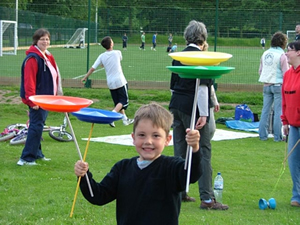
Social Benefits of Circus Skills / Juggling
Juggling is a great confidence builder! It can be learned quickly and is a very rewarding activity with feelings of ‘that’s impossible’, quickly turning to ‘what’s next’!
Self Esteem – When students can get up and perform successfully for adults or other students, self esteem soars. The key to enhanced self esteem is the realisation of one’s self worth, and this is obtainable from the applause of an audience or peer. Self esteem and self confidence can increase dramatically through non-competitive play and the continual success of learning a new trick, which reinforces internal success mechanisms. Juggling is great for children’s mental health because it boosts self esteem & if you have good self esteem you’re more likely to be able to cope with the knocks that life sometimes brings.
Kinaesthetic and Physically active learners will love to learn juggling especially! If you introduce juggling breaks/intervals into your regular studies/school day, then you will see these types of learners improve academically (and we all know that these learners can be among the ones with biggest behavioural problems, don’t we!)
Persistence/Perseverance – When you juggle, you inevitably drop. The student will move past these drops by persevering with the tricks they are working on until they conquer it. All of a sudden, drops/mistakes don’t matter. They are just a stepping stone to success!
Develops Hobbies and Interests – As circus skills are so wide and varied, you are bound to find one particular discipline quite addictive and choose to learn more. In learning your chosen skill in more depth, you may find yourself wanting to perform for others. This in turn requires practice and ‘learning your art’ and so you begin to meet other performers and continue to learn.
Juggling improves confidence, because most people will find that they can do something that they previously thought was ‘impossible’. Once the impossible for them has been achieved, they can then have a different outlook on life where suddenly things are much more achievable! This also has a knock on effect on self esteem. Juggling develops hobbies/interests by giving people an enjoyable activity which is an umbrella for so many different activities including diabolo, spinning poi as well as the more usual juggling items.
Juggling develops teamwork/teambuilding, as it is a fantastic social activity that requires and develops friendships and trust. As students work towards putting on a performance, they may find themselves working closely with other performers. Juggling develops individuality – people can choose to perform their own solo spot.
Make new friends – Students who take part in juggling workshops, will find that they want to teach others their new skills. They will encourage each other and form friendships.
Communication – Juggling gives students a way to communicate with one another through co-operative work on group tasks, by sharing and teaching skills to others, and by monitoring their fellow students advancements. When jugglers who have just learned a trick, try to teach someone else what they have learned, they can potentially show more empathy towards the new pupil than any seasoned juggler could provide! Performing in front of an audience is another method of communication, and this can help students overcome stage fright, fear of public speaking, and improve confidence also.
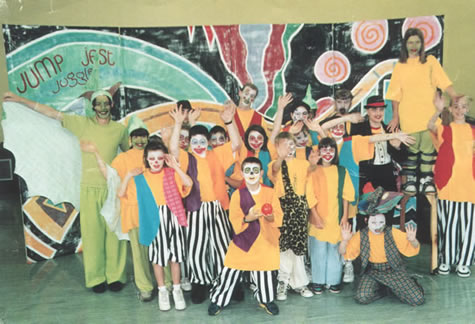
Academic Benefits of Juggling – Extract from this article(opens in new window)
“Juggling provides a series of sequential problems that require the student to calm down, pay attention, listen analytically, observe critically, focus on one activity at a time, plan a learning strategy, go step by step, stay on task, screen out distractions, manage their muscles to act appropriately and with the desired results using successive approximations, persevere through a series of minor failures (drops), analyze final results of the process, and incorporate the newly learned activities into a larger pattern of complex learned activities that can be demonstrated and taught to others. It is a limitless, cumulative, branching model which teaches creative problem solving through direct experience and enhances creativity by offering intrinsic and extrinsic reinforcement with every gain in skill!”
*****************************************
FOLLOW / LIKE / SUBSCRIBE / ENJOY!!
![]()
![]()
![]()
![]()
![]()
![]()
You can hire Steve the Juggler aka Stevie Vegas – for more details try…
Juggler for Hire section – (based in the United Kingdom)
*****************************************
Further Articles to back up all my insights on how Circus Skills can benefit anyone and everyone!
To find out more about Steve’s Juggling Services and how he can best help deliver these Benefits of Juggling to you and your pupils/clients, please take time to have a look around the Juggler for Hire section of the website.
If you are interested in learning some Juggling skills so you can take advantage of all these social/educational/physical benefits also, then please take time to have a look around my online Juggling Store (UK only). You may wish to consider purchasing some Spinning Plates, Juggling Balls, or perhaps a Juggling Kit to get started.
